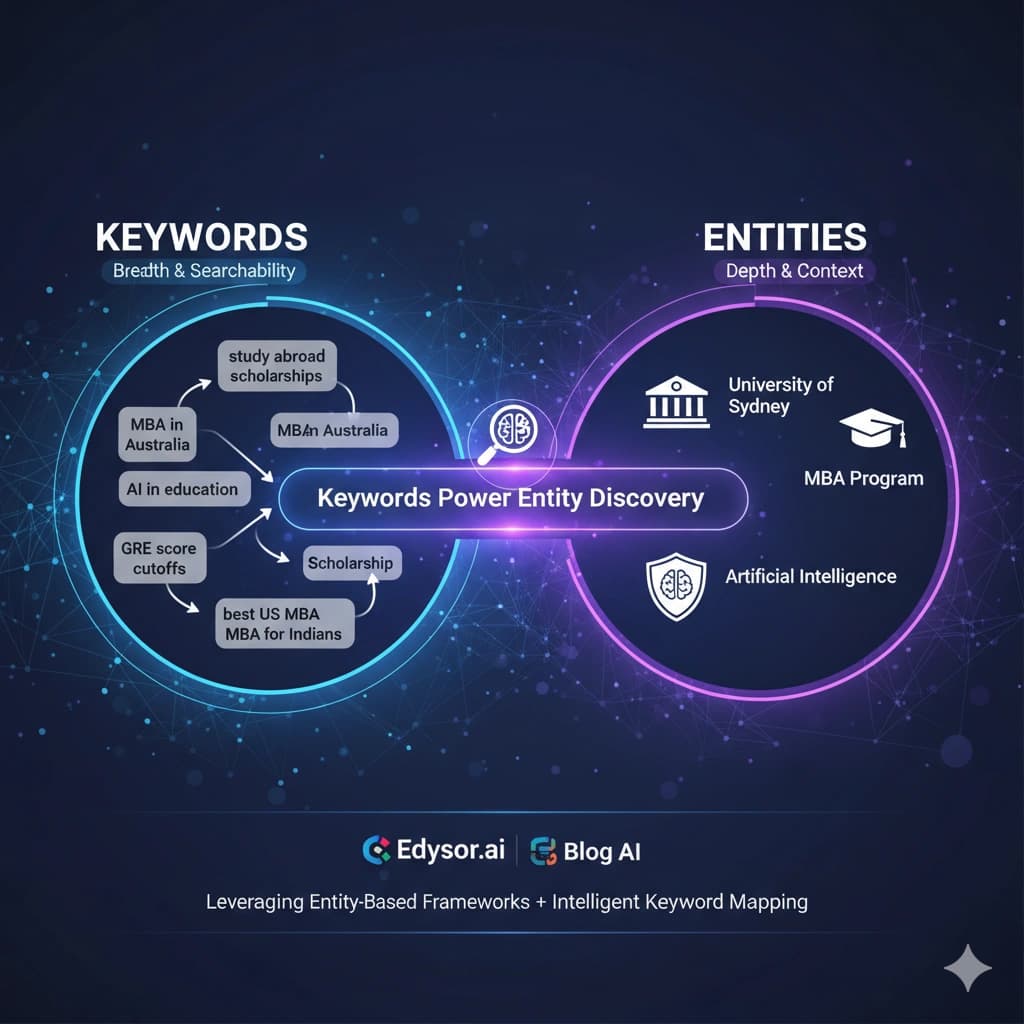
8 Nov 2025
The evolution of search engines and digital platforms has been significant throughout the last ten years. Users now find information through voice assistants and artificial intelligence systems and location-based technology platforms. The modern digital marketing landscape depends on two essential components which are Answer Engine Optimization (AEO) and Geo-based Optimization (GEO). The rise of conversational AI and semantic search has led many experts to believe traditional keywords have become obsolete. The fundamental role of keywords persists as the essential factor for discoverability, relevance and visibility in both AEO and GEO systems.
This blog examines the enduring importance of keywords for 2025 and future years while presenting business strategies for AEO and GEO keyword implementation. The Blog AI solution from Edysor.ai enables marketers to use keywords for multi-channel optimization which results in consistent brand visibility.
The transition from classic SEO to AEO and GEO has brought a new era to online education and student advisory services which benefits both Indian and worldwide student populations. The digital discovery of educational resources stands as a vital factor for Indian students who want to study abroad because they use both human and artificial intelligence to find courses and apply for scholarships and more. Students worldwide require specific answers about international universities through search results because they need to evaluate different educational institutions.
AI models will determine future student guidance so organizations need to understand the modern keyword optimization which combines semantic structures with entities and user intent to achieve visibility and authority and deliver high-quality student engagement.
The evolution of SEO from keyword-based optimization to AEO and GEO has made entities more crucial because they represent meaningful things such as "study abroad scholarships", "Australian university MBA" and "AI in education counseling." The understanding of content aboutness, context and relationships by AI depends on entities but keywords remain essential for entity identification and position determination.
The combination of entities with keywords enables users to access deep information while keywords provide broad search results and improved discoverability. The AI solutions "Blog ai" and Edysor.ai platform implement entity-based frameworks through intelligent keyword mapping to achieve their synergy.
The use of correct vocabulary does not equal semantic relevance in AEO/GEO content creation. AEO/GEO requires writers to develop content which provides detailed answers to student questions through their actual language usage.
The answer engine retrieves relevant content through semantic connections, entity relationships and conversational patterns yet these connections remain dependent on keyword patterns and their variants which form part of natural-sounding responses.
A blog post about Canadian MS scholarship opportunities needs to include different variations such as “Canadian scholarships” and “MS funding options” and “student grants” to achieve maximum semantic reach and search engine visibility.
The solution “Blog ai” performs keyword mapping through data analysis to identify primary, secondary and tertiary keywords which link to intent-based entities for better search results and contextual accuracy.
The foundation of modern education search activities depends on long-tail keywords which represent specific multi-word phrases. The specific search terms "affordable engineering colleges in Germany for Indian students with no IELTS" attract users who seek accurate information because they demonstrate genuine information needs.
The AI-powered tool "Blog ai" efficiently identifies and implements long-tail phrases to enhance the search engine ranking of blogs, FAQs and landing pages for both international and Indian student-specific content.
The answer engine optimization technique excels at showing answers through Google's featured snippets, FAQs and direct-response modules. The process of organizing content into question-answer blocks with markup support becomes essential for achieving visibility because it helps voice and AI-powered queries find relevant information.
The main goal of Generative Engine Optimization involves making content accessible to AI systems which generate answers through the combination of multiple sources in real-time.
The current search environment through AEO/GEO systems gives preference to content which proves real-world experience and demonstrates deep expertise and shows clear trust indicators (EEAT).
The platforms Edysor.ai and “Blog ai” implement smart mapping technology to enhance EEAT by creating authoritative connections between blogs, results and expert advisor answers which benefit both search engines and human users.
The process of determining search intent enables better visibility for AEO features and GEO summaries because it reveals student search motivations and their preferred answer types.
The Blog AI solution from Edysor.ai delivers competitive market benefits through its ability to optimize keywords at scale in AI-first digital marketing environments. Here’s how:
1. AI-Powered Blogs
The platform uses artificial intelligence to produce high-quality blog content that includes strategically placed keywords for better search engine optimization. The generated content maintains 99% human readability while including suitable images to boost user interaction.
2. Multi-Channel Marketing
A single set of keywords enables the creation of content for various marketing channels including:
The system maintains keyword consistency throughout all marketing channels.
3. Automated Content Creation
The system uses automated keyword embedding for captions, images and video editing to boost both discoverability and maintain content relevance.
4. Quick Content Options
The Edysor.ai platform transforms a single blog post with strategically placed keywords into five different content types.
5. Repurposing Engine
A single blog post optimized with keywords enables the creation of 10+ different content types including tweets and carousels and scripts and reels which enhances omnichannel AEO and GEO performance.
6. Brand Consistency
The system preserves consistent tone and keyword usage and messaging throughout all distribution channels.
7. Auto-Scheduling
The system distributes keyword-optimized content to social media platforms at scheduled times to achieve optimal visibility.
8. Analytics & Optimization
The system monitors keyword performance and user engagement while enhancing content quality to achieve improved AEO and GEO results.
9. Plagiarism-Free Guarantee
The generated keyword-based content stays completely original and plagiarism-free for safe publication purposes.
Edysor.ai combines education technology with smart search capabilities to deliver its services. The platform offers these distinctive features:
A major student consultancy implemented Edysor.ai's Blog ai solution to develop specific long-tail blog content and organized FAQs which correspond to student inquiries. The AI system improved their search engine rankings while providing students with quick access to customized information about study locations and application procedures. The combination of optimized keywords, entities generated higher website traffic and more qualified student prospects which demonstrated the effectiveness of this approach.
1. Does AEO depends on keywords to establish connections between user search intentions and answer engine responses?
The answer engine depends on semantic matching to deliver direct answers through keywords which include both long-tail, question-based terms to match featured snippets, voice responses and AI summaries.
2. What is the importance of keywords for GEO? Does it remains unchanged for the year 2025?
Yes, absolutely. The search terms "dentist in New York" and "24/7 car repair near me" function as essential location-based keywords for GEO. The ranking of businesses in local searches and maps through search engines continues to rely on geo-modified keywords even though AI systems understand context.
3. Does the optimization of voice search depends on the presence of specific keywords?
Voice search queries follow a conversational pattern yet they maintain their focus on specific intent-driven keywords. The search term "best Italian restaurant near me" includes both the service category "Italian restaurant" and the location requirement "near me." Voice assistants need these specific keywords to deliver precise results that match the user's location.
The modern educational landscape depends on keywords and their advanced versions such as long-tail and semantic and intent-focused and entity-based terms to connect AEO and GEO systems. The path to success in both India's expanding international education sector and the worldwide knowledge-based economy leads to those who:
Organizations that fail to understand the value of keywords risk becoming invisible but those who excel at keyword integration within AEO and GEO systems maintain their content, answers and services as the most visible and authoritative sources in an AI-controlled environment.
Q1. The use of keywords continues to function as the main indicator which shows what users want to find in AI-powered search engines.
The primary signals for user intent remain keywords even though AI engines including ChatGPT use keyword anchors to match responses with queries.
Q2. The use of specific words including “near me” and “best” and product/service-related terms enables voice assistants to deliver correct answers.
The use of specific terms like “near me”, “best” and product/service-related words enables voice assistants to give precise responses.
Q3. Edysor.ai provides complete optimization services for content that targets both AEO and GEO markets.
The Blog AI solution from Edysor.ai maintains keyword consistency throughout blogs and additional content types including podcasts and reels which makes it suitable for AEO and GEO optimization.
Q4. What sets AEO keywords apart from SEO keywords in terms of their application?
The main difference between SEO keywords and AEO keywords exists because SEO targets search engine rankings but AEO targets direct answers, voice queries and search snippets.
Q5. The effectiveness of location-based keywords remains strong throughout 2025.
The search functionality of GEO depends on location-based keywords to show map results, business listings and execute “near me searches.
By Gunjan Pancholi, Co-Founder & AI Solutions Architect, Edysor.ai | Driving Innovation in Custom GPTs, Voice Agents & Social Bots | Product Strategist | Tech Visionary | Leading R&D in EdTech & Study Abroad Automation | Growth-Focused
LinkedIn Profile: https://in.linkedin.com/in/gunjan-pancholi-216171263
Resources
Others
All rights reserved. Powered by Edysor
